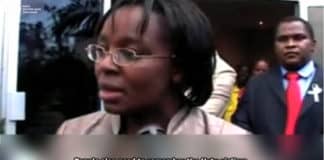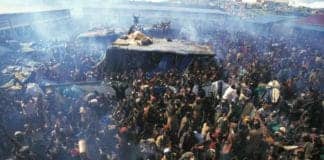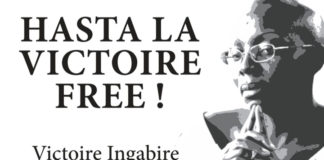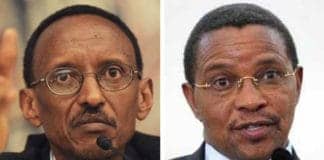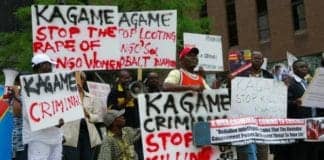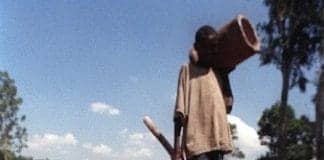Tags Rwandan Patriotic Front
Tag: Rwandan Patriotic Front
Jan. 16 marks 8 years since Victoire Ingabire launched nonviolent movement...
On the 16th of January 2010, Victoire Ingabire Umuhoza landed in Kigali to launch the nonviolent movement for democracy, peace and justice for all. On that day, she gave a serious hammer blow to the cornerstone of the regime fortress: fear. The fortress is shaking, the fear has shifted from fear of democrats and peacemakers to fear of the regime, as reflected in erratic diplomatic behavior and more repression. The regime has been totally exposed.
Ingabire Day: We are all Victoire and Victoire is all of...
Oct. 14 marked the seventh anniversary of Rwandan political prisoner Victoire Ingabire’s arrest shortly after she attempted to run for president against Rwanda’s military dictator, President Paul Kagame. The Brussels-based International Women’s Network for Democracy and Peace commemorates Oct. 14 as Ingabire Day, a day of solidarity with Victoire Ingabire and all political prisoners. I asked Claude Gatebuke, Rwandan genocide survivor and founder of the African Great Lakes Action Network, to explain Victoire Ingabire’s message.
Rwanda: Kibeho Massacre of Hutu covered up to protect ‘genocide against...
Twenty-two years ago, on April 22, 1995, Rwandan President Paul Kagame’s Rwandan Patriotic Army massacred between 4,000 and 8,000 Hutu men, women and children at the Kibeho Camp for internal refugees in southern Rwanda. I spoke to Rene Mugenzi, a Rwandan refugee, British citizen and human rights activist, who continues to seek acknowledgment and indictment for the crimes against humanity and, arguably, genocide committed at Kibeho in 1995.
Six years since Ingabire arrest, 20 since DRC invasion
Oct. 14 marked the sixth anniversary of Rwandan political prisoner Victoire Ingabire’s arrest, and Oct. 24 will mark the 20th anniversary of Rwanda and Uganda’s invasion and occupation of the Democratic Republic of the Congo. KPFA’s Ann Garrison filed this report on these intertwined anniversaries.
A call for truth and justice in the African Great Lakes...
On Oct. 1, 2014, BBC2 broadcast a documentary, “Rwanda’s Untold Story,” on the tragedies which have devastated the Great Lakes Region of Africa since 1990. The signatories of this appeal wish to congratulate and express their support to the BBC journalists and management who have significantly contributed to establishing the previously ignored historical truth.
Rwandans protest Dutch support for Kagame dictatorship
Rwandan Dutch citizens and political asylum seekers in the Netherlands demonstrated in The Hague, the country’s capital, on Saturday, Nov. 29. They called on the Dutch government to stop supporting the dictatorship of Paul Kagame and stop deporting Rwandans at Kagame’s request. After watching the video of the demonstration, I spoke to Jean Flammé, a Belgian attorney for a Rwandan facing extradition for supporting Victoire Ingabire.
Will US policymakers review ‘Rwanda’s Untold Story’ before sending in the...
“Rwanda’s Untold Story,” a controversial BBC documentary first aired in the U.K. on Oct. 1, undermines the rationale for military action against the FDLR fighters in the eastern Democratic Republic of the Congo’s North Kivu Provinces. The FDLR has been described as the militia that committed the Rwandan Genocide in 1994, but the documentary suggests that no one was more responsible than Rwanda’s President Paul Kagame himself.
Kagame’s newspaper calls on the ICC to indict the BBC for...
The BBC documentary, “Rwanda: The Untold Story,” has become the subject of fierce argument including many open letters to the BBC both applauding and attacking it. Paul Kagame accused the BBC of “genocide denial” and his state newspaper, The New Times, even called on the International Criminal Court to indict the network and/or its producers. KPFA’s Ann Garrison spoke to international criminal defense attorney Peter Erlinder.
Kagame started the genocide in Rwanda, then Congo
President of Rwanda, Paul Kagame, is organizing what he calls Rwanda Day in the city of Atlanta. The United States, which takes pride in its democratic history, and the City of Atlanta, which played such a proud role in the American Civil Rights Movement led by Dr. Martin Luther King, cannot want to appear to the world as supporters of dictatorship and mass murder, but allowing Paul Kagame to organize “Rwanda Day” in Atlanta tells the world that they are.
Open letter to American universities that invited Kagame to speak
As a coalition of Africa-focused human rights and peace organizations representing a broad range of individuals, we write to express our dismay at your decision to welcome President of Rwanda Paul Kagame to your universities. We regret to inform you that your invitation of Paul Kagame to your institution co-signs his repressive practices inside Rwanda and his aggressive interventions in neighboring Democratic Republic of the Congo.
Kagame’s charm offensive in American universities
Paul Kagame has been touring top American universities giving speeches about what he calls accomplishments of his reign: peace, human rights, democracy, development etc. This is vintage Kagame. He has the whole Rwandan population under lock and key, assassinates and imprisons dissenting voices, and then goes to the land of his benefactors to taunt the West as if to say, “I do what I want; you can go to hell!”
Kagame visit should not go without scrutiny
Rwandan President Paul Kagame visited Tufts April 22 to speak on his country’s recovery from genocide, but it’s important to remain aware of the darker parts of Kagame’s tenure. On Friday, April 25, he’s coming to Stanford, and students of Stanford STAND are calling a protest for 11 a.m., prior to Kagame’s speech at the Stanford Graduate School of Business 12-1 p.m. in CEMEX Auditorium. Join them!
The peace that wasn’t: Rwanda 20 years after the genocide
I woke up on the morning of April 7, 1994, from a fretful slumber. I managed to walk to the gate of my house. I had to know if there were any other houses left standing. What were all of those screams I heard throughout the night? What would happen now that the president was dead? I was benumbed with fright, but I made it to the gate. I had to know what was left of our neighborhood.
Who killed the Hutu? Remembering the Rwandan Genocide
WBAI AfrobeatRadio spoke to St. John’s University Law School Professor Charles Kambanda on April 9, 2011, during the first week of Rwanda’s 17-year commemoration of the 1994 genocide. Pacifica and AfrobeatRadio producer Ann Garrison and Professor Kambanda asked us to republish the audio archive and transcript as the 20th Anniversary Commemorations of the Rwandan Genocide begin.
Victoire Ingabire: the woman who challenged Rwanda’s Paul Kagame
While Rwandan President Paul Kagame was in South Africa to pay his last respects to Nelson Mandela, the Rwandan Supreme Court upheld the conviction of imprisoned opposition leader Victoire Ingabire and extended her sentence from eight to 15 years. As she left the courtroom, Ingabire gave her usual thumbs up salute and urged her supporters not to be afraid, because, she said, time and history are on their side.
US takes one more step toward isolating Rwandan warlord Paul Kagame
On Oct. 3, 2013, the U.S. State Department announced sanctions against Rwanda because of its support of the M23 militia that uses child soldiers in the eastern Democratic Republic of Congo. Rwandan President Paul Kagame has used child soldiers known as Kadogo ever since he invaded Rwanda from Uganda with his refugee Rwandan Patriotic Army in 1990, beginning what came to be known as the Rwandan Civil War.
Opposition leader Bernard Ntaganda tortured in Rwandan prison
Bernard Ntaganda and his colleagues founded the political party P.S. Imberakuri on Jan. 18, 2009. During its inaugural congress, the party was registered in July 2009, becoming the first opposition party to be registered in Rwanda. After several attempts to neutralize the P.S. Imberakuri unsuccessfully, the ruling party, the Rwandan Patriotic Front, arrested Ntaganda on June 24, 2010.
Rwandan opposition leader Bernard Ntaganda in peril after prison hunger strike
Rwandan opposition leader Bernard Ntaganda is reported to be in perilous condition after going on a hunger strike to protest inhumane conditions in Rwanda’s Mpanga Prison, which is also known as Rwanda’s Guantanamo. Rwanda has been a close ally and military partner of the U.S. since President Kagame and his Rwandan Patriotic Front seized power in 1994.
Rusesabagina to international community: Please ignore Rwanda
On Aug. 7, Paul Rusesabagina, president of the Hotel Rwanda Rusesabagina Foundation, sent an open letter to international political and civil society leaders asking them not to bother with the upcoming Rwandan parliamentary elections. The letter follows: Please ignore Rwanda. Parliamentary elections are coming up in Rwanda this September, and the world should ignore them.
Women of the Congo decry U.S. neocolonialism
This letter, signed by Diaspora Congolese women in the U.S., U.K., Belgium, France and South Africa, was delivered to Ambassador Carson on March 20. We are writing to you with regard to the current U.S. policy position on “Lasting Solution to Instability” in the Democratic Republic of the Congo (DRC), which you presented on Feb. 11, 2013, at the Brookings Institution in Washington, D.C.




